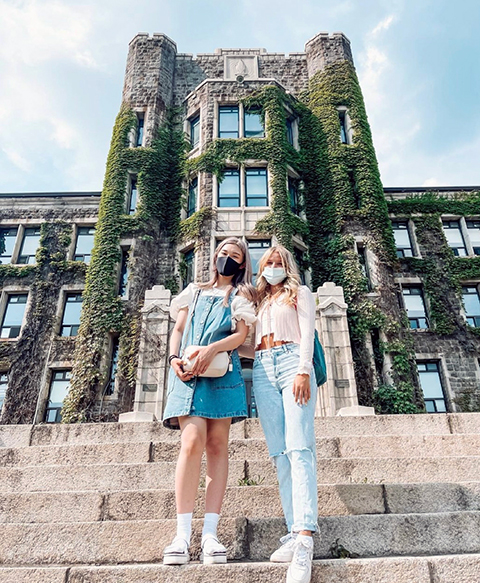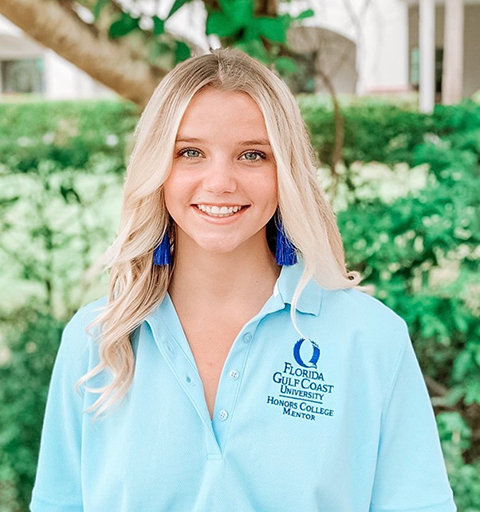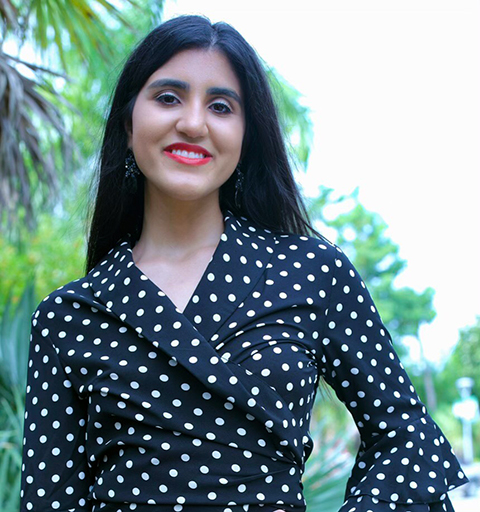That meant lights-out for the Study Abroad program at FGCU. With the pandemic going widespread and plans halted, the department filtered through many refunds, exchanges and rescheduling for students. Matt Ryan, assistant director of the Global Engagement Office at FGCU, said 14 faculty led study abroad groups planned in 2020 along with 84 individual study abroad trips all had to be canceled or cut short. One group of students in Italy were quickly sent back home in March 2020.

One of the ways Study Abroad mitigated the down time was the virtual experience. Indeed, the pandemic squeezed everyone at all levels of education onto their computers, even Study Abroad students. One substitute was Collaborative Online International Learning (COIL), a program through which FGCU faculty works with faculty abroad to immerse students in a virtual study-abroad experience. This online journey includes lectures and seeing a country through modules created in collaboration with FGCU faculty and peers abroad.
Another program for which FGCU is a preliminary subscriber is DiscoverED 360. Developed by the Study Abroad Association, DiscoverED 360 is a platform that highlights nine countries with 360 video and photography. Students have access to guest lectures, videos and virtual tours.
“I always tell students that now is the best age to go out and explore since you guys are always constantly learning,” Ryan said. “I know sometimes it can seem as though there are obstacles, but they can be overcome. If there’s a will, there’s a way.”
As the new school year begins Aug. 18, the COVID-19 scenario continues to be a fluid situation. Many countries have remained open for student visitors, with more safety measures like quarantines and mask mandates. Students who were able to study abroad independently in the spring and summer reported very positive experiences, said Ryan, who hopes programs will soon be back on course for providing students with educational travel experiences.
As overseas trips resume, students can again use travel-related scholarships such as the national Gilman Scholarship, a program that helps students who receive Pell Grants get an opportunity to study abroad. Scholarship recipients can get up to $5,000 a semester with a minimum program length of four weeks.
“We have had 19 Gilman scholarship winners over the past two years, and 12 in the 2020-21 academic year alone,” Ryan said. For comparison, Florida State University had eight winners in fall 2021.
According to the State Department travel advisory, 80 percent of foreign countries were high-danger-levels 3 or 4 during the COVID-19 pandemic. Since the Gilman Scholarship only allows travel to countries that have a travel advisory of level 1 or 2, several scholarship winners had to delay their Study Abroad trips. Even some Gilman scholarship students who were to go to Peru with peers from the FGCU Honors College weren’t able to make that trip due to travel advisories, so the Study Abroad department had to reroute their trips.
Summer in South Korea
One of the Gilman scholars is junior Josie Lorea, an accelerated biology major with a chemistry minor from Charleston, West Virginia. This summer, Lorea took a six-week cell biology course with the Yonsei University International Summer School program in Seoul, South Korea. Yonsei is a private research university deemed one of the three most prestigious institutions in the country for its studies of medicine and business administration. Lorea also completed a Summer Health Professions Education Program online through the University of Nebraska Medical School.

“Yonsei University offered classes that benefited my major, the deadline for the application hadn’t passed, and it seemed like the safest option, ” Lorea said. “As someone who’s never left the country before, Seoul seemed like it would be the easiest place for me to navigate as a solo traveler. And since it was a level 2 on the CDC scale, I could use my scholarships.”
Lorea is also a Perez Family Study Abroad Scholarship recipient and was able to use that gift to help fund her experience. The estimated cost of her trip came to about $8,000, which included application fees, housing, tuition, transportation, school materials and even expenses incurred during quarantine.
COVID-19 guidelines can vary country to country. Upon arriving in South Korea, Lorea was quarantined for two weeks in an assigned hotel room. While in quarantine, she was delivered all her meals, received a total of four COVID-19 tests and had to track her symptoms twice a day through two different applications.
“Even though the quarantine experience itself wasn’t pleasant, everyone who helped me during this process was extremely kind and made it easier,” Lorea said.
Lorea came to find out that its quarantine rules were just the surface of South Korea’s COVID-19 restrictions. For instance, when entering a business, Lorea said she must wear a mask at all times, and even leave her name, residence and phone number for contact tracing in the event someone who visited the area around the same time and place was diagnosed with COVID-19, in which case she’d be notified to get tested.
“Although these rules and regulations can be frustrating at times, they are essential for keeping everyone in the area safe,” Lorea said.
Since Lorea describes herself as a nature-oriented person, one of her favorite experiences has been taking in the lovely view of the Yonsei University campus. When she starts to feel homesick, she likes to use the campus to feel grounded and take in the area’s natural beauty. But she doesn’t have to do it alone.
“Luckily, I have made friends who have turned into family, and everybody here is more than willing to help me on my journey,” Lorea said.
This experience has included a series of “firsts” for Lorea. Besides her first trip outside the United States, it was her first plane trip longer than three hours (this one was 17 hours from Fort Myers to Seoul), and her first extensive trip to a large city.
“Deciding to go abroad alone for eight weeks was probably the scariest thing I have ever done,” Lorea said. “But I’m learning every day from navigating public transportation to simple Korean words and even proper ways to recycle. My experience has been nothing but positive.”
On the travel horizon
With vaccines for COVID-19 administered worldwide and countries starting to lift travel restrictions, new study abroad trips were just weeks away for some students. But the ever-changing pandemic situation already has altered some plans.

Jonelys Lazo, a Cuban-American health science major from Naples, was setting course to the University of Salamanca in Spain for the fall semester, thanks to help from the Study Abroad team.
“I sent an email to Matt (Ryan) about being interested, but after a while, I was already feeling like I couldn’t do it since it can be so expensive, and with everything going on,” Lazo said. “But once he emailed me back, we talked back and forth, and even had my mom on the phone for some meetings since she had so many questions, too. And he (Matt) was amazing. He guided me through the process of narrowing down the program, applying for financial aid, and even helping me start the application.”
The University of Salamanca has its own hospital for students, which was one of the reasons Lazo chose this program, along with wanting to go back to her Spanish roots.
“This is a great opportunity because I am a STEM major, and shadowing doctors in a foreign country is really going to stick out on an application,” Lazo said.
Unfortunately, since Lazo’s acceptance to Salamanca, the program was canceled due to low enrollment. Ryan rearranged for Lazo to be part of an online program while in Seville, Spain, instead. From September to October, Lazo will be taking FGCU classes online while living in a native family’s home for her new study abroad experience.
The University of Salamanca (when it resumes) and the Yonsei University programs can be found on the Study Abroad web page. There is even a map of the world that shows different programs all around the globe. The department caters to each student’s needs and can fit the right travel opportunity to each individual.
Indeed, with a new academic year comes new opportunities, and Study Abroad is back as much as safety protocols allow. As the Fleetwood Mac song “Go Your Own Way” tells us, “Everything’s waiting for you. You can go your own way.” And that once again includes studying abroad.
— Ariadne Vasquez is a senior majoring in communication with a concentration in public relations who is part of a news internship team with FGCU Marketing and Communications. Student interested in a newswriting internship should contact Keith Gibson at [email protected].[/vc_column_text][vc_column_text]
TO LEARN MORE
For more personalized information on Study Abroad programs, contact Matt Ryan at 239-590-1494 or set up an appointment to get your next trip started.[/vc_column_text]